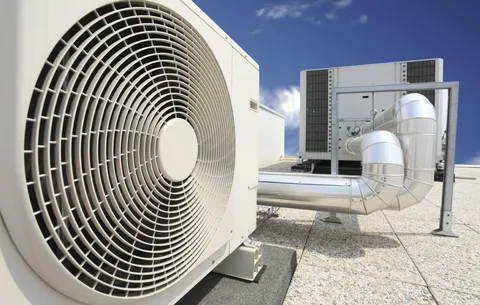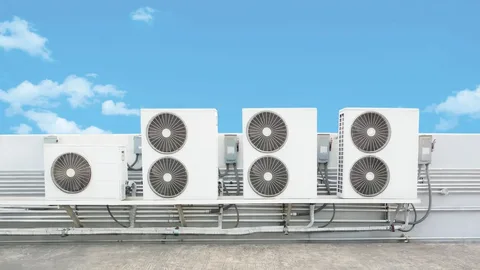Let’s uncover a secret. For optimal health, we need more than a balanced diet, regular exercise, and enough sleep. The quality of air we breathe indoors, especially at home, also plays a vital role. As a result, Mechanical-Ventilation, an often overlooked aspect of modern living, deserves your attention. In this blog post, we will highlight the incredible benefits of Mechanical Ventilation, including energy efficiency, improved air quality, humidity control, and much more.
Energy Efficiency
One of the paramount benefits of Mechanical-Ventilation systems is their energy efficiency. To understand why, let’s look at how these systems work. They continuously replace stale indoor air with fresh outdoor air, simultaneously exhausting the stale air out. This constant airflow can help keep your home at a comfortable temperature, reducing the need for heating or air conditioning. In fact, some systems even include heat recovery features, capturing and reusing the heat from the outgoing air to warm the incoming fresh air.
Moreover, by improving your home’s indoor air quality and reducing humidity levels, Mechanical-Ventilation can also make your heating and air conditioning systems more efficient. Moist, polluted air requires more energy to heat or cool than fresh, dry air. Therefore, by reducing the indoor humidity and pollutants, your HVAC-system won’t have to work as hard, saving energy and lowering your utility bills.
What’s more, the latest Mechanical-Ventilation systems are designed with energy efficiency in mind. They feature low-energy fans and advanced control systems that adjust the ventilation rate based on occupancy, time of day, or air quality sensors, ensuring they only operate when needed.
Improved Indoor Air Quality with Mechanical Ventilation System
When it comes to indoor air quality, a Mechanical Ventilation System acts as a much-needed breath of fresh air. It diligently works to replace stale, contaminated air with fresh, clean outdoor air. But how does this improve indoor air quality?
For starters, indoor air often contains a cocktail of pollutants, such as dust, allergens, and volatile organic compounds (VOCs). These can come from everyday household items like furniture, carpets, cleaning products, or even from the very humans and pets residing in the space. In a poorly ventilated home, these pollutants have nowhere to go, causing the air quality to deteriorate and potentially leading to health issues over time.
Enter Mechanical-Ventilation systems. By constantly bringing in fresh air and exhausting stale air, these systems dilute and reduce the concentration of indoor pollutants, thus mitigating their potential health risks.
Effective Humidity Control with Home Ventilator
Managing the right balance of indoor humidity is an unsung necessity of comfortable living. It’s more than just about avoiding the sticky discomfort of a humid summer’s day. Too much humidity can encourage the growth of mold and mildew, while too little can cause dry skin and irritation. Here’s where a Home Ventilator enters the picture, acting as an efficient humidity regulator for your home.
Home-Ventilator work in harmony with your home’s heating and air conditioning systems to maintain an optimal indoor humidity level. As they introduce fresh air from the outside and expel stale, moist air from inside, they inherently assist in keeping your home’s humidity in check.
Additionally, when the humidity level rises, which is common during hot, muggy days or after activities such as showering or cooking, the ventilation system ramps up its operation. This process ensures that the surplus moisture is swiftly removed, preventing any condensation build-up or dampness in your home.
Home Ventilator Cost is Affordable
While initially, Home Ventilator Cost may seem substantial, it’s essential to view it as an investment. The price varies widely, depending on the system’s size, features, and installation complexity. However, the financial benefits that come with it are significant.
When considering the affordability of a Home-Ventilator, remember to account for the energy savings it will bring. As highlighted earlier, these systems improve the efficiency of your heating and air conditioning systems, reducing energy consumption and ultimately lowering your utility bills. In many cases, the energy savings alone can cover a substantial portion of the system’s cost over time.
Plus, the added health benefits can potentially save on medical costs associated with respiratory issues or allergies caused by poor indoor air quality. These systems also help to avoid potential repair costs associated with mold, mildew, and structural damage due to excessive humidity or poor ventilation.
Boosting Property Value
Incorporating a Mechanical-Ventilation system into your home isn’t just a health and comfort investment, but also a strategic move in increasing your property’s market worth. Prospective homebuyers today are savvy about the perks of efficient, modern homes. They are drawn to properties that promise healthier living environments, energy savings, and superior comfort. A home outfitted with a Mechanical-Ventilation system offers just that.
Such a system becomes a selling point, adding a layer of appeal to your home. It demonstrates that the house has been designed with care for the environment, energy efficiency, and the residents’ well-being in mind. For buyers, this signifies reduced future costs, both in terms of energy usage and potential health expenses, making your home an attractive investment.
Furthermore, the visible absence of dampness, condensation, or mold, all of which are effectively managed by Mechanical-Ventilation, are added bonuses to potential buyers. These indicators of a well-maintained property can contribute to a favorable impression during home viewings, further enhancing your property’s value.
Ensuring Comfort and Well-being
Indoor air quality is not just about removing pollutants and allergens; it is intrinsically linked to our comfort and overall well-being. A Mechanical-Ventilation system creates an atmosphere that is not just clean, but also comfortable and healthy. By ensuring a steady flow of fresh air, it can alleviate common respiratory issues and allergy symptoms, leading to improved health and enhanced quality of life.
The constant cycle of fresh, filtered air also helps in reducing unpleasant odors, whether they come from cooking, pets, or household chemicals. This contributes to a more comfortable and pleasant living environment, free from distractions that can disrupt relaxation or focus. Beyond physical comfort, there’s a psychological comfort too. Knowing your home is continually replenished with fresh air and free of harmful pollutants can give you peace of mind.
You can feel confident that your living environment is supportive of your health and the well-being of your loved ones. A Mechanical-Ventilation system is more than just a machine; it’s an active participant in your home’s ecosystem. Its role is crucial in creating an indoor environment that promotes wellness, comfort, and ultimately, a higher quality of life. With Mechanical-Ventilation, every breath taken indoors is a step towards healthier living. Therefore, in the pursuit of a comfortable and healthier home, Mechanical-Ventilation plays a pivotal role.
Reducing Noise Pollution with HVAC System
Another seldom-discussed benefit of a HVAC System is its ability to lessen noise pollution. If you reside in a bustling neighborhood or near a busy road, noise pollution can significantly disturb your peace and quiet. By creating a sealed indoor environment, a Hvac-System can provide a sound buffer against external noises.
Moreover, today’s advanced Hvac-systems are engineered with low-noise operations in mind. They are equipped with low-noise fans and sound-absorbing materials that keep operational noise to a minimum. These systems work silently in the background, providing continuous ventilation without any disruptive noises. Compared to traditional methods of ventilation like opening windows, which can let in unwanted external noises, these systems offer a much quieter alternative.
 Minimizing Condensation and its Effects
Minimizing Condensation and its Effects
Condensation is a common household problem that, if left unchecked, can lead to a myriad of issues. From cooking to showering and even simply breathing, everyday activities can generate a significant amount of moisture in the air. When this moisture-filled air comes into contact with colder surfaces such as walls and windows, it cools down quickly and turns into liquid, resulting in condensation. Over time, this moisture accumulation can escalate into serious issues such as mold and mildew growth, peeling wallpaper, and even structural damage to the property.
Enter the Mechanical-Ventilation system – your home’s personal moisture manager. These systems consistently introduce fresh, dry air from outside and extract the stale, damp air from inside, effectively reducing the overall humidity levels in your home. As a result, condensation is kept at bay, and the likelihood of moisture-related issues is significantly reduced. When you engage in activities that produce a lot of moisture, like cooking a big meal or taking a hot shower, your Mechanical-Ventilation system can respond by increasing its operation.
This ensures that the excess moisture is quickly whisked away, thereby preventing any sudden build-up of condensation in your home. Moreover, some advanced Mechanical-Ventilation systems come with humidity sensors that allow them to automatically adjust their operation depending on the current humidity level in your home. This intelligent feature further enhances the system’s effectiveness in controlling condensation. In essence, a Mechanical-Ventilation system acts as your home’s sentinel against condensation and its subsequent effects, effectively preserving your property’s structural integrity and your living comfort.
FAQs
Q: How Does A Mechanical Ventilation Work?
A: Mechanical Ventilation work by continuously replacing stale indoor air with fresh outdoor air. This process helps to keep the home at a comfortable temperature and improves the indoor air quality.
Q: Are Mechanical-Ventilation Systems Energy-Efficient?
A: Yes, Mechanical-Ventilation systems are designed with energy efficiency in mind. They feature low-energy fans and advanced control systems that adjust the ventilation rate based on occupancy, time of day, or air quality sensors. These features can reduce your energy consumption and lower your utility bills.
Q: Can A Mechanical-Ventilation System Improve My Home’s Indoor Air Quality?
A: Absolutely! Mechanical-Ventilation systems replace stale, polluted indoor air with fresh, clean outdoor air. They also include filters designed to trap airborne particulates and allergens, which can significantly improve your indoor air quality.
Q: Can Mechanical-Ventilation Systems Control Humidity Levels In My Home?
A: Yes, Mechanical-Ventilation systems can effectively regulate the humidity levels in your home. They introduce fresh air from outside and extract stale, moist air from inside, helping to maintain an optimal indoor humidity level.
Q: Are Mechanical-Ventilation Systems Noisy?
A: No, modern Mechanical-Ventilation systems are engineered with low-noise operations in mind. They feature low-noise fans and sound-absorbing materials, ensuring quiet operation.
Conclusion
In essence, the benefits of Mechanical-Ventilation extend far beyond simply enhancing indoor air quality. This powerful system works behind the scenes to support your well-being, comfort, and peace of mind. From reducing indoor pollutants and humidity, minimizing condensation, curbing noise pollution, to promoting energy efficiency, its positive impacts on your home are substantial. It’s an essential tool for creating an optimal living environment. The initial investment in a Mechanical-Ventilation system pales in comparison to the long-term benefits it brings in terms of health, energy savings, and home value.
| Related Business Listings |
| Contact Directory |
| Local Business Profiles |



